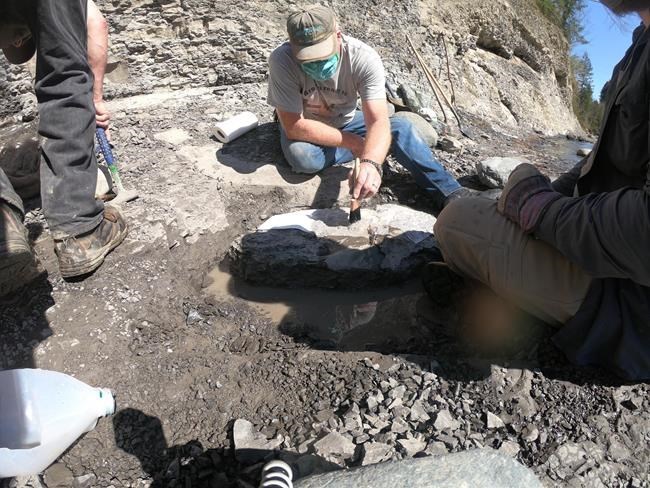COURTENAY, B.C. — Russell Ball was taking one of his usual walks along Vancouver Island's Puntledge River on a cool, grey day in January when he noticed something out of the ordinary.
As he knelt down and began chipping away around the patch of brown, he felt a familiar feeling as it grew bigger and bigger.
There's a glee that comes when you think you've found a new fossil, or are about to break open a concretion, the compact mass that forms around fossilized materials, he said.
"Every single time I do that, it's the same fun as opening a gift. You don't know what's going to be inside there," he said in an interview while at the same river outside Courtenay, B.C.
"And when you find a fossil, you're the only person in the history of humans to have ever seen that creature."
Although the retired military expert in explosives disposal has collected thousands of fossils in his spare time over the years, this one turned out to be special.
Experts at the Royal B.C. Museum believe the prehistoric, approximately 84-million-year-old specimen may be one of two known species of ancient sea turtle previously found in the area. Or, it could be a new species altogether.
The process of extracting and identifying the fossil has also involved the Vancouver Island Paleontological Society and the B.C. Fossil Management Office.
"We won't know for certain until we get the bones completely free of the rock, so we can look at them in fine detail," said Derek Larson, the museum's paleontology collections manager, who happens to specialize in turtle fossils.
The fossil is so old that when the turtle was alive, Vancouver Island was in a completely different location further south and below the ocean's surface, Larson said.
The only other turtle fossil from the same area and time period was identified from a single jaw and parts of its limbs, so this specimen could offer a more complete skeletal record.
The Puntledge River is a known hotbed for fossilized creatures without backbones, such as clams and ammonites, but vertebrates like this sea turtle have been rare.
British Columbia is largely "an unwritten book" on fossilized vertebrates of the Cretaceous period, the last portion of the dinosaur era, Larson said.
"We do know there are fossils here, but we're only now discovering the true potential and diversity in the area," he said.
"(The turtle fossil) is another sort of piece of the puzzle bringing back to life this millions-year-old ecosystem that we know very little about so far."
Discovery of the oldest fossils in the museum's collection dates back to the 1800s, but the research never took off in B.C. the way it did in neighbouring Alberta, home to Drumheller, the "Dinosaur Capital of the World."
"I think we're going to see that shift, especially with the number of amateur fossil finders" and a new fossil research program at the museum, he added.
For his part, Ball is already doing what he can to spread his love of fossils. He offers fossil tours and also presented some of his treasures to school classrooms before the COVID-19 pandemic.
"I'd hand them pieces of fossils they can hang onto and look at. It's what a lot of kids need — the actual touch and feel and smell and sometimes even the taste of a fossil," he said.
Taste? Over time, Ball said, the bone becomes "sticky" and will kind of hang to your tongue as if you'd licked a frozen flagpole.
"It's amazing how many youngsters are happy to get in there and lick one," he said, laughing.
"That's fine by me, it's good old-fashioned rock, it's not going to hurt you."
— By Amy Smart in Vancouver.
This report by The Canadian Press was first published May 23, 2021.
The Canadian Press



